- Home
- David Liss
The Coffee Trader Page 3
The Coffee Trader Read online
Page 3
My true name is Avraham, as was my father’s name and his father’s. All firstborn Alferonda men have secretly called their firstborn sons Avraham for as long as Jews have had secret names, and before that, when the Moors ruled Iberia, they called themselves Avraham openly. For much of my life, I was not permitted to speak my name aloud except in dark rooms, and then only in whispers. Those who would question my actions should remember that. Who would you be today, I ask you who judge me harshly, if your own name was a secret whose revelation could cost your life and the lives of your friends and family?
I was born in the Portuguese city of Lisbon to a family of Jews who were not allowed to pray as Jews. We were called New Christians, or Conversos, for our ancestors had been made to take the Catholic faith or surrender their property—and often their lives. Lest we face torture and ruin and perhaps even death, we prayed publicly as Catholics, but in shadows and in cellars, in secret synagogues that moved from house to house, we prayed as Jews. Prayer books were rare and precious to us. In the light of day a man might measure his wealth in gold, but in the dark of those dark rooms, we measured wealth in pages and in knowledge. Few among our number could read the Hebrew of what few books we had. Few knew the right prayers for the holy days or for Shabbat.
My father knew, or at least he knew some. Having spent the first part of his childhood in the East, he had grown up among Jews unrestrained by the law from practicing their religion. He had prayer books that he lent out freely. He owned a few volumes of the Babylonian Talmud, but he knew no Aramaic and could make little sense of its pages. The Secret Jews in Lisbon came to him for instruction in the rudiments of reading the holy tongue, of the prayers for Shabbat, of fasting on fast days and feasting on feast days. He taught them to eat out-of-doors during Succoth, and of course he taught them to drink themselves to a merry stupor on Purim.
Let me be direct: my father was no holy man or sage or saint. Far from it. I admit this freely and think it no insult to his name. My father was a trickster and a cheat; in his hands, trickery and cheating were beautiful and marvelous things.
Because he was schooled in the ways of our faith—no scholar, mind you, but simply a man with an education—my father was tolerated among the Secret Jews of Lisbon in ways he might not have been otherwise, for he brought far more attention upon himself than was wise for any New Christian. Wherever merchants with a few spare coins might find themselves, my father would be there with his potions to lengthen life, improve virility, or cure any malady. He knew tricks with cards and balls and dice. He could juggle and rope-dance and tumble. He knew how to train dogs to add and subtract simple numbers and how to train cats to dance on their hind legs.
A natural leader of men, my father attracted to him others who made their living through countless deceptive and curious entertainments. He commanded an army of cardsharps and dice cheats, fire-eaters and blade swallowers. Those who could earn a living simply by displaying the shapes with which nature had burdened them also rallied to my father’s banner. Among my earliest childhood companions were dwarfs and giants, the monstrously fat and the horrifically gaunt. I played games with the snake boy and the goat girl. As I grew older I developed an unhealthy curiosity about a person my father knew who had the anatomy of both a man and a woman. For a few coins, this unfortunate would allow anyone to watch it fornicate with itself.
When I was but ten years of age my father received a late-night visit from an older boy, Miguel Lienzo, whom I recognized from synagogue worship. He was a roguish fellow, as much drawn to my father’s company of tricksters and oddities as he was to my father’s learning. I say he was roguish, for he loved always to defy one authority or another, and in the time I knew him in Lisbon those authorities he loved defying most were his own family and the Inquisition itself.
This Lienzo came from a line of relatively sincere New Christians. There was no shortage of these: men who, out of either genuine belief or merely a desire to avoid persecution, conformed entirely to the Christian way and shunned those of us who sought to live as Jews. Lienzo’s father was a successful trader and had, in his opinion, too much to risk the ire of the Inquisition. Perhaps for this reason alone, Miguel came eagerly to our secret prayer meetings and struggled to learn what my father could teach him.
More than that, young Miguel used his father’s connections with the Old Christian community to learn what he could of the Inquisition. He had a keen ear for rumor, and he delighted in providing warnings where he could. I knew of a half dozen families who had fled the night before the Inquisitors pounded on their doors—all because Lienzo had known where to lurk and listen. I believe he did these great deeds both from a desire to see justice done in the world and for the pleasure of treading where he had no business. Years later, when I saw him again in Amsterdam, he never recognized me or even remembered what he had done for my family. I have never forgotten his kindness, though some have insisted otherwise.
Miguel came to warn us after he had volunteered to help our priest scrub his private chambers in the church (he always volunteered for these thankless tasks in the hopes of gaining some intelligence) and had then chanced to hear a conversation between that wretch and an Inquisitor who had developed an interest in my father.
And so, in the dark of night, we left the only home I had known, taking many of our friends with us. We were Jew and Christian and Moor and Gypsy all, and we traveled to more cities than I can now enumerate. For years we lived in the East, and I was fortunate to spend many months in the holy city of Jerusalem. It is but a shadow of its former glory, but there were times in my unfortunate life when the memory of those days, of walking the streets of my nation’s ancient capital, visiting the place where the holy Temple once stood, have sustained me when I could find meaning in nothing else. If it be the will of the Holy One, blessed be He, I shall return sometime to that sacred place and live out my remaining days there.
In our travels we also traversed Europe, and we were in London when my father died of a brain fever. I was then five-and-twenty, grown to a man but not a man of my father’s disposition. My younger brother, Mateo, wanted to take command of the army of outcasts, and I knew he had the character to lead them. Though I had wandered for years, I was not myself a wanderer. I could perform card cheats and dice tricks, but not half so well as Mateo. I could get a dog to do nothing but show me its belly and a cat to do nothing but knead upon my lap. My father had always spoken of the importance of Jews to live as Jews and among Jews, and I recalled from a visit to Amsterdam some years earlier that in that city Jews enjoyed a degree of freedom unrivaled in the rest of Christendom.
So I crossed the North Sea and found myself embraced by the large community of Portuguese Jews who lived there. I was, at any rate, embraced at first. And that is why I write this memoir. I wish to make clear why I was unjustly exiled from a people I loved. I wish to tell the world that I am not the villain it thinks me. And I wish to set on paper the true facts regarding Miguel Lienzo and his dealings in the coffee trade, having been much blamed in that sphere, and blamed very unfairly too. It is my intention to describe my doings in Amsterdam, the conditions of my excommunication, my life in that city afterward, and precisely what role I played in Lienzo’s affairs.
It is true that before I knew how to walk I could hide a card in my clothes and make the dice roll the way I wished, but I vow to practice no trickery in these pages. I will be like the Bear Man, a petulant fellow with whom I traveled for years. I will disrobe to show you nature’s truth. If you like, reader, you may even pull on the fur to see that it is no deception.
2
Geertruid could never understand the difficulty Miguel faced in doing business with her. She might smile sympathetically when he spoke of his fears, but in the end she almost certainly believed his resistance was some willful Hebrew eccentricity, like not eating squid or refusing to talk business on Saturday day, but being happy to talk on Saturday night.
Miguel hated that she should think him foolis
h or stubborn. When he would violate some small law or other—drink impure wine or labor, just a little, on the Sabbath—she would ask how he could do these things and still purport to care so much for his observance. He did not know how to explain that no one but a tsadik—a saint—could hope to obey all the laws; it was the effort that brought a man closer to the Holy One, blessed be He.
Though he had told her about his past, Geertruid still had no understanding of what it had been like to live as a Secret Jew in Lisbon, with only a vague notion of who he truly was. If it was so truly terrible, she would ask, why do any of you Jews remain?
Why indeed? Because it was where they had always lived, for hundreds of years. Because their families were there, their businesses. Some stayed because they had no money, others because they had too much. The stories of freedom to worship in Amsterdam or in the East sounded as elusive as the coming of the Messiah.
Many New Christians embraced Catholicism with a slavish fervor, and Miguel’s father had been such a man. Not that he believed deeply, but he believed deeply in convincing the world of his sincerity with his regular church attendance, his public denouncement of Jewish “superstition,” his donations to the Church. New Christians, sincere or not, lived in a single community, and Miguel’s father wanted his sons to stay away from the backsliders. “My grandparents chose to convert rather than be exiled,” he had explained, “and I’ll not dishonor their choice.”
Perhaps for the pleasure of defying his father, perhaps because it was dangerous, Miguel had begun secretly attending study groups when he was still a boy. The older men there encouraged him, made him feel special with their praise, and let him know without words that they too thought his father a great boor. Miguel had loved the feeling of being included in something larger than himself and of doing something wicked that was, at the same time, righteous.
Miguel’s younger brother, Daniel, understood this division between father and son and exploited it, showing his father every day in a dozen ways that he was not one of those horrible backsliders who brought nothing but woe to their community. Their father was inclined to favor Daniel at any rate, since he looked far more like his side of the family. Miguel bore a striking resemblance to his mother’s father. Daniel had always been thin, like the elder Lienzo, all hard angles and sharp corners, eyes too large for his face, hands too small for his body. Miguel took after his mother’s side—meaty men who commanded attention, just the sort of man the elder Lienzo had always despised.
When his father discovered that Miguel had been attending the secret synagogues, he called him a traitor and a fool. He locked Miguel in a room for a week with nothing but wine, some dried figs, two loaves of bread, and a chamber pot far too small for so long a duration. Later Miguel would find this choice of punishment horribly ironic, for it was his father the Inquisition had taken and locked in a prison and tortured—accidentally, they claimed—to death. He had been named by another Converso who, under the Inquisitor’s knife, had shouted any names he could recall, whether they be Christian, Jew, or Mohammedan.
Miguel had been three years gone by then, after a rupture with his father over his marrying a woman with an insufficient dowry. Miguel’s father had absolutely forbidden the marriage. Not only had Katarina too little money but her family consisted of well-known Judaizers who would bring down trouble on the rest of them. And, he insisted, she was far too pretty. “I don’t like to see you with so beautiful a girl,” he’d said to Miguel. “It’s unseemly for you to marry a better-looking woman than your father did. It makes you appear undutiful.”
Miguel was not so easily swayed by dowries, and he thought it perfectly seemly to marry someone pretty. But more than beauty, Katarina had possessed great understanding. Her family was devout, and she had an uncle who was a great Talmudist in Damascus. She understood Hebrew better than most men in Lisbon. She knew the liturgy and could keep a home in accordance with the holy writings. Miguel’s father had spat on the floor when Miguel announced that they had secretly married. “You’ll regret defying me,” he’d said, “and you’ll regret marrying a woman who knows how to read. I won’t say another word to you until you come to me and beg my forgiveness.”
Four months later, when Katarina had died of a sudden fever, they spoke for the last time. “Thank Christ that’s over with,” his father had said to Miguel at the conclusion of the funeral. “Now we can get you married to someone who will do our family some good.” Two weeks later, Miguel boarded a ship bound for the United Provinces.
While Miguel established himself in Amsterdam, his father and brother continued to export wine and figs and salt, but then the Inquisition arrested the elder Lienzo and everything came to an end. By Portuguese law, the Church could confiscate the material goods of anyone convicted by the Inquisition, so wealthy merchants made particularly popular victims. After suddenly expiring during a questioning session, Miguel’s father was found guilty posthumously, and the family business ceased to exist. Left with only a few items in his own name, Daniel had no choice but to leave Lisbon. Following his brother and the mass exodus of Conversos to Amsterdam had seemed the inevitable choice.
The Ma’amad had welcomed Miguel when he came to Amsterdam; its teachers helped him expand his understanding of the holy tongue, taught him the liturgy, and explained the holy days. Though still disoriented with grief for Katarina, those first few weeks had been full of excitement and learning, and though his circumcision was an event best not recollected too often, even that bloody affair had been moving. However, it was not long before he discovered that the council’s aid did not come without its price. The parnassim, the men who composed the Ma’amad, ruled absolutely, and those who would live in the community lived by their law or were cast out.
Two evenings after his meeting with Geertruid, Miguel had attended a study meeting at the Talmud Torah. Here was where the Ma’amad shone. Study groups met constantly in the synagogue’s cloistered chambers. Jews recently escaped from Iberia and the Inquisition, who knew nothing of their faith but that it was in their blood, learned how to conduct themselves, to pray, to live as Jews. In the next chamber wise men, the chachamim, argued details from the Talmud that Miguel did not believe he would ever begin to comprehend. He met with a group of men not unlike himself—returned within the past few years but dedicated to embracing the ways of their fathers. They read in Hebrew the weekly Torah portion and worked through its meaning while a chacham, who served as their guide, discussed the Talmud commentary.
Miguel loved these meetings. He looked forward to them all week. He had not the luxury to study quite so much Torah at home as he would have liked—though he did try to go to the early morning study sessions at least once or twice a week—and what time he did have he did not always use wisely. These meetings were therefore doubly precious. For the space of a few short hours he was able to forget that reckoning day crept cruelly toward him, and the brandy futures he’d bought so impulsively would make his debts even more hopeless.
In the halls of the Talmud Torah, just after his meeting, Miguel paused with his friend Isaiah Nunes to continue debate on the interpretation of a particularly thorny bit of Hebrew grammar. Nunes traded mostly along the Levant routes but had recently begun to expand into Portuguese wine. Having sampled too many of a buyer’s wares before the meeting started, he now argued loudly. His voice echoed off the high ceilings of the nearly empty synagogue as they made their way toward the exit.
Nunes was a large man, bulky without exactly being fat. Not yet thirty years old, he had already managed to establish himself as a man to be reckoned with in the Levant routes. Miguel liked the young trader, but there were limits to how much an indebted widower his age could like someone so young and successful. Almost by accident Nunes stumbled on lucrative deals; he invested cautiously but with obscene success; he had a beautiful and obedient wife who had given him two sons. However, these accomplishments were tempered by Nunes’s inability to take pleasure in anything he’d done. Growing up, he�
��d witnessed one relative after another taken by the Inquisition, and he’d become nervous by disposition. He regarded his success as a mere illusion, a trick of the devil aimed only to raise Nunes’s expectations before dashing them.
The two made their way out in the darkness, for only a few candles burned in the common areas. Nunes had been in the midst of a long harangue, half of which was pure nonsense, as he reasoned, backtracked, apologized for making little sense, and then demanded that Miguel agree with him. Then he stopped short and bent over.
“By Christ, I’ve just broken a toe!” he shouted. Like most Jews from Portugal, he cursed like a Catholic. “Miguel, help me along!”
Miguel bent to help his friend. “You drunkard, on what did you break a toe?”
“On nothing,” Nunes whispered. “It’s a ruse. Don’t you know a ruse when you see one?”
“Not if it’s a good ruse.”
“I’ll take that as a compliment, I suppose.”
“Now that we have established that you have only pretended to break your toe in order to fool me,” Miguel said quietly, “perhaps you might tell me why you would do such a thing.”
“By the Virgin,” Nunes cried out, “it hurts! Help me, Miguel!” In the dim light of sparse candles, Miguel could see Nunes close his eyes in a moment of concentration. “There’s a man lurking in the shadows by the door,” he added more quietly. “He’s been watching you.”

 The Whiskey Rebels
The Whiskey Rebels Renegades
Renegades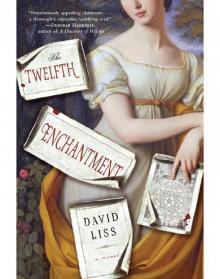 The Twelfth Enchantment: A Novel
The Twelfth Enchantment: A Novel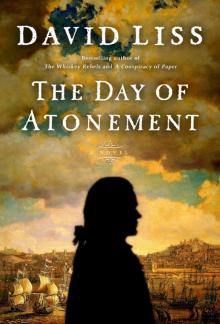 The Day of Atonement
The Day of Atonement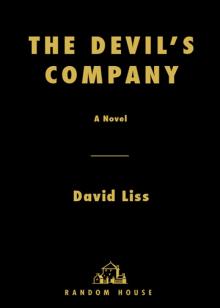 The Devil's Company
The Devil's Company Randoms
Randoms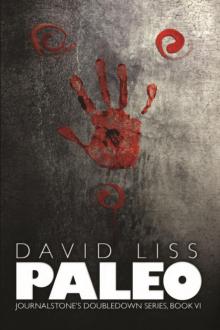 Paleo / The Doomsday Prepper
Paleo / The Doomsday Prepper Rebels
Rebels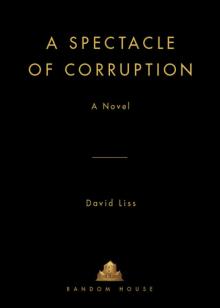 A Spectacle of Corruption
A Spectacle of Corruption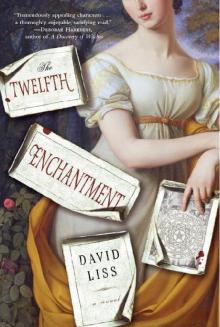 The Twelfth Enchantment
The Twelfth Enchantment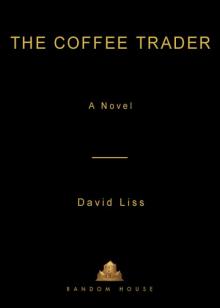 The Coffee Trader
The Coffee Trader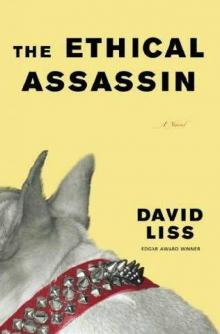 The Ethical Assassin
The Ethical Assassin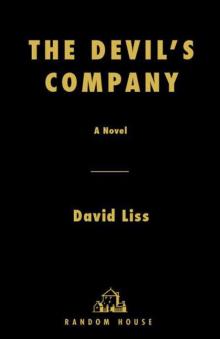 The Devil’s Company: A Novel
The Devil’s Company: A Novel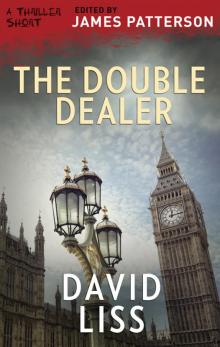 The Double Dealer
The Double Dealer The Whiskey Rebel
The Whiskey Rebel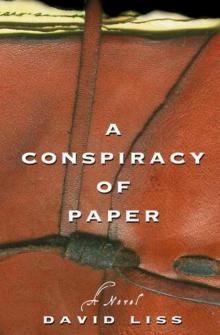 A Conspiracy of Paper bw-1
A Conspiracy of Paper bw-1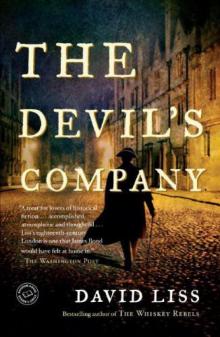 The Devil's Company bw-3
The Devil's Company bw-3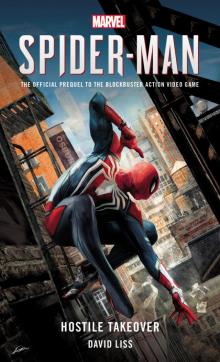 Marvel's SPIDER-MAN
Marvel's SPIDER-MAN